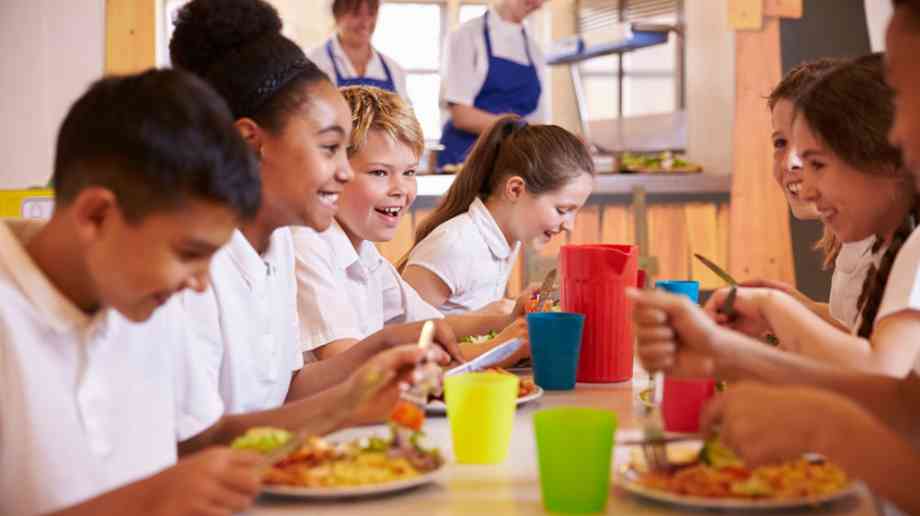
Why school meal communication matters
Poor communication around school meals is leaving families underinformed, contributing to missed entitlements and potentially poor nutritional choices. The 2025 School Meals Report reveals why bridging this communication gap is vital for pupil’s health and equity
Good communication is the backbone of any successful system – but when it comes to school meals, too many families are being left in the dark. According to the 2025 School Meals Report, produced by ParentPay Group in partnership with LACA – The School Food People, nearly half (49 per cent) of UK parents feel underinformed about what their children are eating at school.
The report, drawing insights from more than 236,000 parents, reveals a significant communication gap – one that is contributing to missed entitlements and potentially poor nutritional choices. But it also highlights a clear opportunity: by improving how schools, caterers and families share information, we can better support the pupils we all serve.
Let’s look at the three critical areas where school meal communication is falling short – and why it matters.
Free school meals: eligible but unused
One of the most pressing consequences of the communication gap is the underuse of free school meals (FSMs). Despite 25.7 per cent of UK children now qualifying, uptake lags behind. And with over 500,000 additional pupils expected to become eligible by 2026, collaboration will be essential to ensure families don’t miss out.
“The reasons are familiar but persistent. Parents may be unaware they qualify, unsure how to apply, or uncomfortable claiming FSMs due to stigma or uncertainty about meal quality. Some schools still rely on paper forms or inconsistent communication methods that make it harder for families to stay informed or feel confident opting in,” commented Phil Roberts, group chief growth officer at ParentPay Group.
“The research shows a clear disconnect between what’s on offer and what parents know,” adds Judith Gregory, chair of LACA. “Improved communication isn’t just about awareness – it’s about ensuring more children benefit from nutritious meals that support their learning and wellbeing.”
Better uptake of FSMs is also tied to increased funding. When more eligible children take up free meals, schools receive additional resources they can invest back into provision and pupil support. Clear messaging can go a long way in encouraging participation.
Breakfast provision is another area with untapped potential. According to the report, 55 per cent of UK schools offer breakfast clubs, yet a third (33 per cent) of parents say their child doesn’t attend. More surprisingly, 24 per cent of parents didn’t even know if their child’s school provided a breakfast option.
This matters. Breakfast clubs are proven to boost concentration, attendance and behaviour – particularly for disadvantaged pupils. Yet without clear promotion and communication, these services remain underused.
“When services like breakfast clubs go unpublicised, families miss out and so do schools,” says Roberts. “We need to make it easier for parents to access this information in real time – not rely on word of mouth or dated letters home. We’ve seen schools implement simple push notifications or app updates that have dramatically improved breakfast club participation,” he added.
Obesity and the health agenda
Improved communication also has a vital role to play in supporting the government’s health ambitions. The NHS 10-Year Health Plan for England aims to raise the healthiest generation of children ever. Yet nearly one
in four children leave primary school with
obesity.
School meals are a proven tool to promote healthy eating and reduce inequality – but only if families trust and engage with what’s on offer. When asked what would encourage them to choose school meals, 19 per cent of parents cited more menu choices and less repetition, whilst 17 per cent wanted more affordable options.
“We’re at a tipping point,” says Roberts. “With rising costs and growing health concerns, we cannot afford to treat school meals as a secondary issue. Communication is key to building confidence and increasing participation. The more families know about what’s on the menu, the more likely they are to opt in – and that helps everyone.”
Parental support for food education is also strong. Nearly 80 per cent of parents back lessons on nutrition, food origins and healthy cooking – an opportunity for schools to link classroom learning with the lunch hall experience.
“If parents see their children learning about food, it builds trust in the meal service,” adds Gregory. “It becomes part of a bigger picture – not just a menu.”
“School meal communication should start at the dinner table at home,” says Roberts. “That only happens if schools provide the tools – visual menus, meal ratings, dietary insights – so families can talk about food together.”
Allergy management
For families managing allergies, clarity and consistency are especially important. The report reveals a widespread desire for clearer allergen labelling, real-time updates, and easier access to meal information. That reassurance can be the difference between anxiety and peace of mind.
“Parents of children with allergies face daily uncertainty,” says Roberts. “Digital platforms can provide clear, timely updates about allergens and menu changes, but they need to be supported by consistent practices across schools. There’s a great opportunity here to improve reassurance without increasing workload.”
According to the report, more than 70 per cent of parents rated their school’s allergen management as “good” or “very good” – but nearly a third (31.8 per cent) didn’t know how their children’s school handles allergens at all. “Transparency saves lives,” says Gregory. “No parent should have to guess if their child’s lunch is safe. That’s why we’re committed to supporting our members with the tools to ensure parents are informed and their children’s allergens are well managed.”
The case for change
Closing the school meal information gap doesn’t require reinventing the system. The 2025 School Meals Report outlines a practical roadmap for schools and caterers. This includes: using pre-booking systems to give families more control and sharing menus, sourcing information and allergy details online and in real time. It also includes proactively promoting FSM eligibility and simplifying applications, as well as embeddimg food education into the curriculum. The roadmap also suggests setting up clear feedback channels between home and the kitchen.
“Digital tools are a powerful enabler,” says Roberts. “They allow schools and caterers to communicate clearly, receive feedback instantly, and adapt menus quickly. We’re already seeing how this improves meal uptake and parent satisfaction.”
“We see a real opportunity for schools and caterers to use tech-enabled solutions to increase visibility, share menus, and gather feedback,” he adds. “It’s not about adding workload – it’s about building a smarter, more joined-up experience for families.”
Communication at the core
“School food is part of the solution to so many social challenges,” says Gregory. “But it only works if we build a shared understanding with parents. That’s how we turn school food into a valued part of school life – not just a service that’s taken or left.”
Communication has often been treated as a support function in school meal delivery. But if we’re serious about tackling food insecurity, obesity and health inequalities, it’s time to move it centre stage.
“This is more than a kitchen issue,” says Roberts. “It’s about equity, education and empowering families. We have a collective responsibility to ensure no child misses out because of a lack of information.”
The 2025 School Meals Report doesn’t just diagnose the problem – it provides a route to progress. What’s needed now is momentum. School leaders, policy makers and catering providers must work together to build a more transparent, inclusive and informed system.
Because when families are informed, children eat better. And when children eat better, they do better. That’s a resolution every school leader – and caterer – can get behind.
Further Information:Latest News
08/01/2026 - 10:30
The government is launching a new app allowing students to view their GCSE results on their phones for the first time from this summer.
08/01/2026 - 09:45
Education Business LIVE has announced that Professor Samantha Twiselton OBE of Sheffield Hallam University will speak at the event in March 2026, delivering two thought-provoking sessions focused on initial teacher training and SEND provision.
07/01/2026 - 10:10
Solve for Tomorrow is a free, curriculum-linked programme which is mapped to Gatsby Benchmarks 4, 5, and 6, helping teachers embed careers education without adding to workload.
06/01/2026 - 10:24
London's universal free school meals programme has not led to improvements in pupil attainment during its first year, but has eased financial pressure and reduced stress for families.
05/01/2026 - 10:44
New regulations have come into force from today, banning adverts for unhealthy food and drinks before 9pm, and online at all times.







